Math Inquiry Project – Comparing countries in math achievement
 Loading...
Loading...
Math Inquiry Project – Comparing countries in math achievement
 Loading...
Loading...
Topic: The topic that I chose for my Inquiry was “calculating emotions” this to me is something that everyone can relate to, as the goal with our inquiry was to find math in a topic that isn’t considered mathematical. I thought that our emotions are something that is relevant to every single person no matter their math background.
Main Questions: In my inquiry I talked about the makeup of emotions, how our brains respond to emotions, dopamine, examples of emotional equations {we did an interactive piece where everyone had the opportunity to calculate the ration of their anxieties and fears, and finally I talked about how subjective emotions are and the chaos theory of how sensitive these equations are.
Further Questions and Extension: While doing my Inquiry project I became very interested in a lot of branches of emotions and how math can be related in a bunch of different aspects, I came up with the further questions; is it possible to measure the intensity of an emotion?, how many emotions is it possible to feel at once?, how can we chemically relieve addiction and fit our medications specifically to a person and their ratio of emotions? and finally, with all the information we have about a persons life is it possible to calculate how someone is going to feel after a certain experience. My dad actually got me a book on emotions after my project and I have been looking through it and have developed some even further questions based on what I have read; How has the media affected the intensity of our emotions? Are the generations becoming more or less sensitive, how and why?
Part 1-Mutation Story:
I am the APP gene found in my host, Mary’s Body. I give instructions to the body on how to make Amyloid precursor protein. I don’t know why but it’s what I’m built to do. I build the protein using amino acid isoleucine. Fragments of the protein are then sent to her brain. I don’t know why or how this happens. But I do it because it’s the only thing I can do.
“Sorry, I forgot to pick him up.” Mary, my host says to the babysitter. Embarrassed that she left her son with the babysitter for the third time. She headed to her car George laughing. “It’s okay Mommy it happens” Mary knew it wasn’t going to be okay. “Mrs. Smith.” The babysitter calls to my host. Mary turns around. “You also forgot your car keys.” Mary confused takes the car keys and heads to her car. “Mommy I need to be buckled up.” George says as Mary is about to start the car. She sighs, “I’m sorry George I’m just not having a good day.” George laughs. “It’s okay mommy.
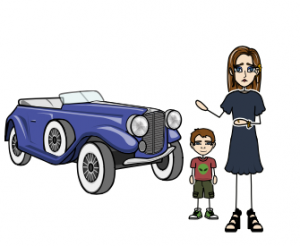
The week continued on the same pattern. Mary was trying her best to be cautious on what she said. She knew what was coming and so did Brian her husband. The moment it got too much was when Mary was sick in her bed watching TV. “Who are you” Mary asked her son. George, only 4 years old, confused replied with a laugh “Mommy, I’m George your
son.” “I’ve never met a George.” Mary isn’t joking I can feel it. She is forgetting her son just as her Mom forgot her. “Daddy” George calls. “Mommy forgot who I am” Brian rushes in taking George from the room. He knows what they dreaded is here. Brian calls an ambulance to take Mary to the hospital, she was resistant the whole way there and Brian is hiding his tears as he leaves George with a babysitter.
The doctors run some tests on Mary, even though they know from her last checkup that it’s here. I feel when they poke the needle into her and take blood. It tickles. A few hours later the doctors come back with the results for Brian. He sits next to Mary’s bed. Mary groggily sits up. “Where am I?” She asks. “Who are you” She asks Brian. A tear rolls down Brian’s cheek. The doctor starts to talk to Brian. I listen attentively. “There is a problem with the APP gene.” Thats me. “The APP’s role as a gene is too provide a way for the body to make Amyloid precursor protein which scientists research say help bond cells together.” What does this have to do with me? “It is rare, but this gene has a mutation.” I’m mutated? “In Maggie’s body, the APP gene has changed a building block for this protein and interfered with enzymes in the protein leading to the replacement from amino acid valine to amino acid isoleucine. It has a protein position of 717. Because of this mutation, one of the genetic code letters has been altered.” What I’m doing isn’t normal? “With the alteration and mutation, fragments of this rare protein begin to clump in her brain forming hallmark plaques, which is how early onset Alzheimers is formed.
“This gene has formed in your wife’s brain because of hereditary reasons, the early onset version of Alzheimers Disease is hereditary. It comes from her mom as she had the same disease. Families with this disease have flaws on chromosomes 1 and 14 and are passed down genetically.” It’s all my fault. I come from her mom so it’s my fault. Brian nods. He knew it was coming. When Mary’s mom died she had refused testing. She said it was hereditary and she would get it too.
For the rest of Mary’s life I live in her body. The instructions I give to her body are “mutated” as the doctors put it. But there is nothing I can do. I was unaware of it but now i realize parts of me are being sent to her brain to clump up and kill her memory completely. 8 years have gone by and as Mary lays in bed with Brian and 12 year old George. “Who are you?” Mary asks George. “I’m George.” He replies for the millionth time, “Who’s George?” she asks.
Alzheimers patients don’t die from the actual disease but what the disease affects. For example malnutrition because the patient neglects to eat or believes that he or she has already ate. They can also die from infections such as pneumonia. The Alzheimers risk gene is more common in females then males. There are two types, the type that Mary had was Familial the other type is a risk gene that usually occurs later in life, towards ages 60 and 80. Familial occurs between ages 30 and 40. Alzheimers is the leading cause to Dementia.
Part 2-The making of the mutation story:
To investigate this topic I first started by typing in questions that I found really related to the topic would help to write a story about my life as a gene of an Alzheimers patient. I asked What mutations are found in Alzheimers?, What is a common age for early onset Alzheimers?, How do people die from Alzheimers?, Brain damage on Alzheimers patients?, What genes are mutated when Alzheimers occurs? How do people receive this genes? I really had to read into these websites to find out the behaviour of an Alzheimers patient and the role of the gene so that I could be the gene and talk about the roles that I had. I used citation machine, a site I learned about when working on my SSEP project in science, in order to cite my work and verify the dates so that the information wasn’t too far out dated. I also used storyboardthat.com a familiar digital tool that I learnt about in socials class in order to create characters to move along the story. Pinterest was another website I used to find images that would help me and my readers understand the disease. The process of completing the challenge went really well, I was able to learn about the disease and how it affects the lives of people and what gene causes them. I feel like the only thing that could have gone better would have been to have chosen a disease that already had more information because the APP gene still doesn’t have a full explanation as scientists have not figured it out. I would have liked to have more information to work with.
Citations:
Alzheimer’s Disease: Genetics and Risk Factors. (2015, April 25). Retrieved December 11, 2016, from http://www.webmd.com/alzheimers/guide/alzheimers-genetic?page=2
Grimaldi, D. M., S., I., & 5. (2008). Why Do People Die from Alzheimer’s Disease? Retrieved December 11, 2016, from https://www.agingcare.com/articles/if-alzheimer-s-is-a-disease-of-the-memory-how-do-people-die-from-it-133297.htm
Grimaldi, D. M., S., I., & 5. (2008). Why Do People Die from Alzheimer’s Disease? Retrieved December 11, 2016, from https://www.agingcare.com/articles/if-alzheimer-s-is-a-disease-of-the-memory-how-do-people-die-from-it-133297.htm
Miller, G. (2012, July 12). Gene Mutation Protects Against Alzheimer’s. Retrieved December 11, 2016, from http://www.sciencemag.org/news/2012/07/gene-mutation-protects-against-alzheimers
Photo citations
Cartoons created by Ashiana using storyboard that
U.S. National Library of Medicine. (2016, December 6). Alzheimer disease – Genetics Home Reference. Retrieved December 10, 2016, from https://ghr.nlm.nih.gov/condition/alzheimer-disease
Imagerie Médicale. (n.d.). Retrieved December 11, 2016, from https://www.pinterest.com/explore/imagerie-médicale-919860055351/
Any Genetic Counselors or professionals involved in … (n.d.). Retrieved December 11, 2016, from https://www.bing.com/cr?IG=C4ABEDD3B1944DAEB6E41E5215738405&CID=14EA1187E3A56C0C00E6186EE2946DD7&rd=1&h=47r6bRYbgOhZ6xqOcgRZbPaV17lCuhM1qxcaVMObybw&v=1&r=https://www.reddit.com/r/genetics/comments/244ki2/any_genetic_counselors_or_professionals_involved/&p=DevEx,5041.1
(n.d.). Retrieved December 11, 2016, from http://www.genecards.org/cgi-bin/carddisp.pl?gene=APP
Do the Anti-Alzheimer’s Effects of Grape Seed Extract (GSE) Start in the Gut? Your Gut Bugs Could Save Your Brain. (n.d.). Retrieved December 11, 2016, from http://suppversity.blogspot.ca/2015/02/do-anti-alzheimers-effects-of-grape.html
Name of your host: Ayaz Sunderji Relationship to you: Father
The Interview:
1. What is your job title?
He is a Wealth Planner at Vancity Credit Uni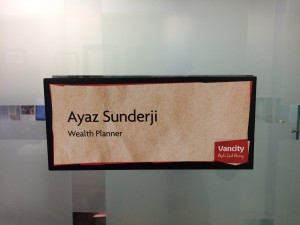 on.
on.
2. What is your job description?
Helping members with their financial well being, by creating a plan thats based on their personalized goals and dreams. The process that he uses involves understanding the members personalized needs & expectations and ensure that the investment recommendations are aligned with values that are important to you.
3. What are the duties and/or tasks you perform at your job?
4. What qualifications do you have for this job in the following areas:
a) training?
On the job training, by fellow colleagues, the investment department and attending workshops taught by the industry.
b) education?
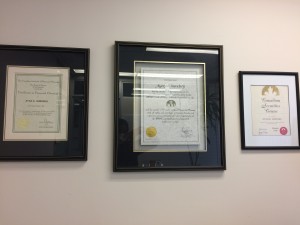 Certified financial planning designation through self studies and the financial planning standards council, a degree in bachelor arts in economics from University of victoria , Canadian investment security through the Canadian securities Institute.
Certified financial planning designation through self studies and the financial planning standards council, a degree in bachelor arts in economics from University of victoria , Canadian investment security through the Canadian securities Institute.
c) experience?
In the financial industry since 1992. Mutual Fund License since 1995. Ismaili volunteer for the BC Economic Planning board.
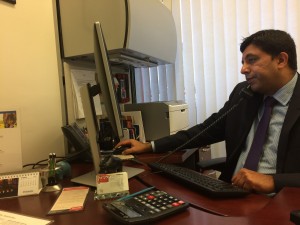
d) skills and attributes (personal qualities)?
Patience, Knowledgable, Resourceful, People Skills, Listening, Communication, Good understanding about finance and math.
5. What are some of the things you like about the job?
6. What are some of the things you dislike about this job?
7. How do you anticipate this job changing in the next 5 years or so?
Already seeing changes and the biggest one has been technology, the advent of robo-advisors and lower cost investment options. In the future it will empower people to do investment themselves and the technology is advancing so you can get you’re on advice without seeing someone so to be successful you will need more education and how to utilize the technology to you’re advantage.
Other question (s):
Student Reflections:
1. Give three reasons why you would like this job (be specific):
a) I like the fact that I would get to work for people and help them make decisions on how they want to invest their money, because working with people is something that I’m good at and I would like to be able to help them make important decisions and give them advice.
b) The job involves numbers and math and I enjoy math. I think that I would be good at calculating money and taking the calculations into consideration when I help them to make long-term choices.
c) I’m interested in how stocks work, buying for cheap and selling for more is a concept that is very interesting so I think it would be interesting to work in a job that includes investments and making decisions based on the market.
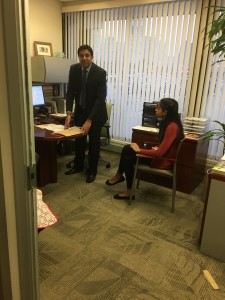 2. Give three reasons why you would not like this job (be specific):
2. Give three reasons why you would not like this job (be specific):
a) I don’t know if I would like the environment, sitting at a desk all day in an office is something that I wouldn’t enjoy because I am a person that likes to learn and work in more ways then just sitting, I would like a job that consists of moving around and action.
b) Aside from appointements with members this job has a lot of paper work and not that much collaboration with others, I wouldn’t like to work alone for majority of the day because I feel that I want more communication with people in the job. I feel that I am a person that learns more by communication.
c) A job with more variety of tasks and where I would need more education to be able to work. Because this is a specialized job and I would prefer something more investment opportunities for my members.
3. Is this job for you? Why or why not?
I don’t think this is a job for me, mainly because of the environment I would be working in. I feel that I would want a job with more action and moving around more, I don’t want to sit at a desk all day. However, I feel that this job does fit a lot of the qualities that I possess, working with people, math, and I’m resourceful but I feel that a job with even more communication and collaboration is something that I would be more interested in. Because of the qualities that it takes in the future if I change my mind about where I want to be I may enjoy this job.
4. Explain the value of the TOKTW experience in relation to your ideas about your post secondary (after high school) plans (education?, training?, travel?, work?).
Today I was given a look into how an office job would be, what it’s like to work at a credit union, the jobs of a wealth planner and even how an appointment works. I know after today that I would like a bigger education and I would not like to specialize in one category because I feel that I need more moving around and action post-secondary. I would definitely like to be trained by people in the same and different fields as me so that I can learn different tools from differen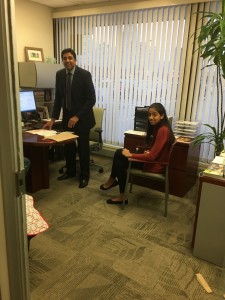 t perspectives. After I graduate I do want to travel but I will be going to school straight away so travelling will be done in the summer. I know today that I want to work somewhere were I’m on the go and not stuck in an office all day, I want something where I get to work with people and help them to make important choices and decisions based around their personal needs.
t perspectives. After I graduate I do want to travel but I will be going to school straight away so travelling will be done in the summer. I know today that I want to work somewhere were I’m on the go and not stuck in an office all day, I want something where I get to work with people and help them to make important choices and decisions based around their personal needs.